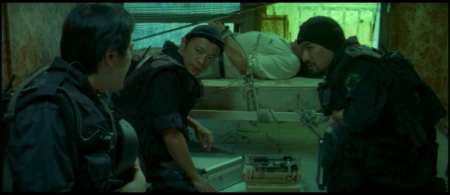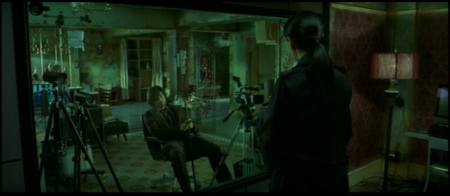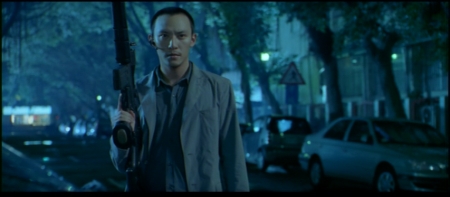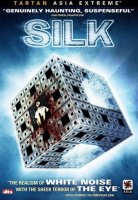BUY IT AT AMAZON: CLICK HERE!
STUDIO: Tartan Video
MSRP: $22.95
RATED: NR
RUNNING TIME: 109 Minutes
SPECIAL FEATURES:
• Deleted scenes and alternate ending
• "Making-of" featurette
• Outtakes
• Trailers
The Pitch
"What if Arthur C. Clarke tried to write a ghost story?"
The Humans
Chang Chen, Yosuke Eguchi, Karena Lam, Barbie Usu.
The Nutshell
A diabetic research scientist named Hashimoto has been working for years to harness the power of fractals to create anti-gravity, or at least that’s the goal he writes down on the grant papers. His real goal is to use the same fractal constructs to capture ghosts and study them for his own nefarious purposes. When his team manages to isolate the ghost of a little boy, Hashimoto brings in a world class investigator to help uncover the truth of the boy’s demise. With fractals.
Something goes horribly awry, and at this point you’d be forgiven for assuming it’s the script.

Big Damn Lilliputians.
The Lowdown
Silk was a Taiwanese entry into Cannes in 2006, a film heralded as one of the most expensive Taiwanese productions to date. Neither its selection in the festival nor is large budget are qualities that will linger in the audience’s mind after sitting through to the credits. Rather, the film does its level best to leave the audience with faintly bemused expressions on their faces, like those you find on the judges of middle school talent shows.
"Why exactly were we exposed to this, again?"
The construction of the plot contributes mightily to that sense of patient annoyance. Rather than following the trends of the Asian horror or action markets, the script combines the world of a driven, slightly mad scientist with that of a cold-on-the-outside, vulnerable-on-the-inside cop, and sets them to investigating a particularly potent haunting. The introduction to these characters is so laborious that by the time a half hour has passed, you’ve barely got them speaking to one another. You’ll have to hang on another twenty minutes before something happens.

It takes a special kind of stupid pervert to install the one-way glass the wrong way ’round.
I’ve got nothing against the melding of genres. I can’t imagine I’d survive long as a movie fan if I did; but doing so requires a deep knowledge of each of the genres being included, the ways they function, and the qualities they share through which they can connect. Take Shaun of the Dead as a near-perfect example. Edgar Wright and Simon Pegg displayed a brilliant combination of humor and horror, because they allowed each moment to play to its potential. They found the horror in the humorous, and the humor in the horrific.
With Silk, the filmmakers have their twin stories operating with a conceptual connection, but not an organic one. You have your weatherbeaten cop with a sick mother, engaging in some unnecessary detective work. Seriously, anybody could have done what the cop does. Most people probably wouldn’t have caught a schoolgirl as collateral damage, though. What use is a cop story if the cop could be swapped out for a paperboy, or a goldfish, or my sweet aunt Fanny? No use, as it turns out, except for participating in a series of revelations, which I’ll attack a little further down.
The script does marginally better with the ghost story. The ghost boy gets a good backstory, and participates in some sufficiently creepy maneuvers. However, the script pays more attention to Hashimoto the researcher, who has a stunted Ahab complex, a cocky grin, and absolutely nothing to recommend him to audiences. His quest for [anti-gravity/immortality/fractal cubes] is abstract, tied to no concrete or relatable event, which means that the half of the movie that features Hashimoto comes off as dull.

Goin’ ghost huntin’. Don’t worry, kids: he sprayed his bullets with tiny cubes.
So, to sum up, the filmmakers thought it would be wise to combine a cop story with virtually no detective work and a ghost story with no discernible horror components. After demonstrating a barely-visible understanding of the two genres, it’s no big surprise that the melding of them is unsuccessful.
It doesn’t help matters that the writers made the mistake of implying character depth via revelation, rather than by actually writing decent characters. Instead, at important turns of the story, we suddenly realize that X has a dying mother, that Y is suffering from a debilitating disease, that Z is bitterly angry at his employer, etc. These moments substitute left-field attacks for natural storytelling.
I haven’t yet mentioned the critical mass of wacky concepts, including eyedrops that let you see ghosts, ghosts that are immaterial and can adjust their size, strands of the titular silk betraying victims to their ghoulish attackers, the fact that the cop has an entire city arsenal in the trunk of his SUV, and trapping a ghost by closing a fucking door. I’m content to hate on the weakness of the script without all these additional details, but they deserve mentioning for their combined featherweights dragging the film further down. In trying to lend Silk distinction through its layered genres, the filmmakers ended up with a movie that possesses only the barest of identities, and I’m not sure I even like what little it has.
The Package
Bonuses include the standard complement of cutting-room junk: deleted scenes that had every right to have been, an outtake reel, and an alternate ending not radically different from the normal. There’s also a set of trailers, and a brief marketing behind-the-scenes featurette.

